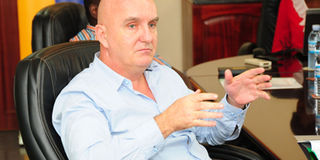Beverage industry players seek to attract low end consumers

Mr Greg Metcalf, the managing director, Nile Breweries Limited, speaking at a news conference in Kampala last week. He said his company wants to get the informal market to consume their products. COURTESY PHOTO
What you need to know:
Beer makers want to use local raw materials to appeal to the conservative market.
Kampala
Beer industry players are seeking to invest in local raw materials in the manufacturing of products in an attempt to lure the traditional brew drinkers into formal beer drinking segment.
Industry statistics show that Ugandans are still average drinkers, consuming about 10 litres annually compared to South Africans’ 80 litres and Czechoslovakia leading with 100 litres per person annually, making them the highest alcohol consumers in the world.
To raise the numbers, the industry market leader, Nile Breweries Limited (NBL), is targeting the informal drinkers, (those who drink local brew). “We are looking at getting informal markets into consuming our products and growing our markets as well,” the new managing director NBL , Mr Greg Metcalf, said last week in his first news conference in Kampala.
“We will be using more of the local raw materials to make affordable products that are appealing so that we can move people from informal drinking,” he added. According to him, his company will be investing more in production of local barley, including employing the services of experts to help farmers here enhance their yields—both in terms of quality and quantity.
In the last five years alone, NBL has invested $250 million (about Shs650 billion) in nurturing its brands, putting up new production lines and consolidating its market shares among other investments.
Speaking in an earlier interview while at the launch of a Single Malt Dinner hosted by Mr Swithin Munyantwali, a renowned lawyer and a businessman in Kampala, Mr Nyimpini Mabunda, the Uganda Breweries managing director, said his company has embarked on restructuring with the aim of moving its brands forward.
“Most of our elites and the middle class are already going places. So we are giving them something exclusive (wide brand of exclusive whisky portfolio) that they will enjoy as they network and do business with each other,” he said.
Market shares wars
Meanwhile, Mr Metclef said he will be unhappy if by the end of his time at the helm of Nile Breweries, he does not increase the market share currently at 60 per cent, according to statistics. He said: “Since we are the market leaders here it will be difficult although I am not content with the 60 per cent market shares. We will continue to improve our capacities and invest in upgrading our investments as we also look at getting the returns in investment.”
When asked about the market share, in an earlier interview, Mr Nyimpini said it is difficult to tell because there is no independent verification yet. However, he said if there is any difference then it is minimal—probably 55 to 60 per cent.




